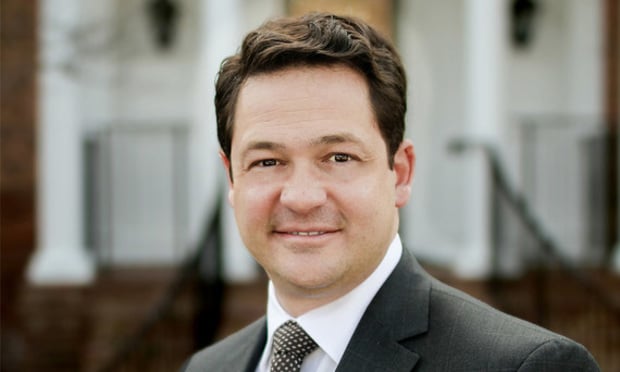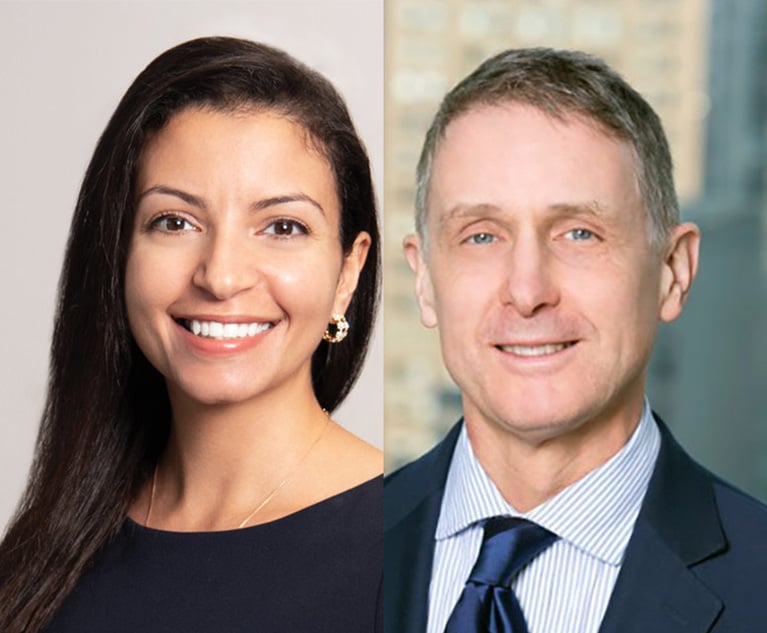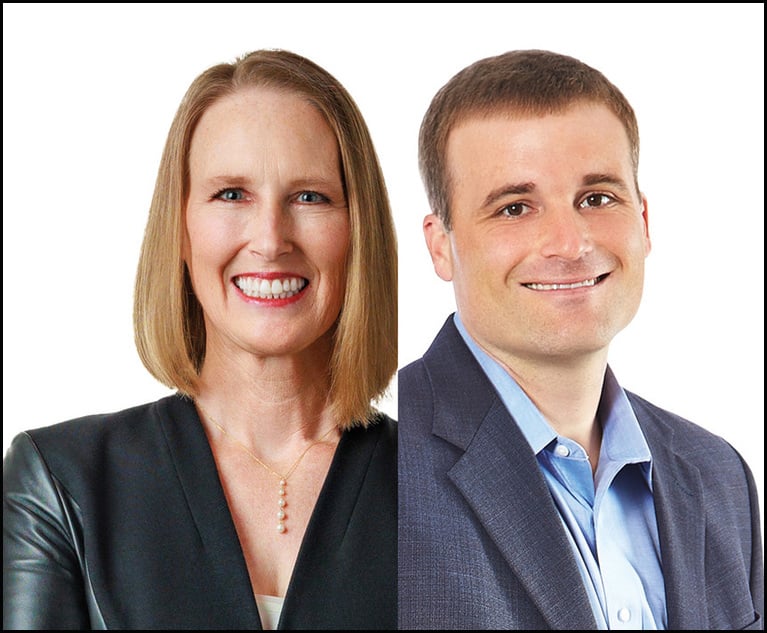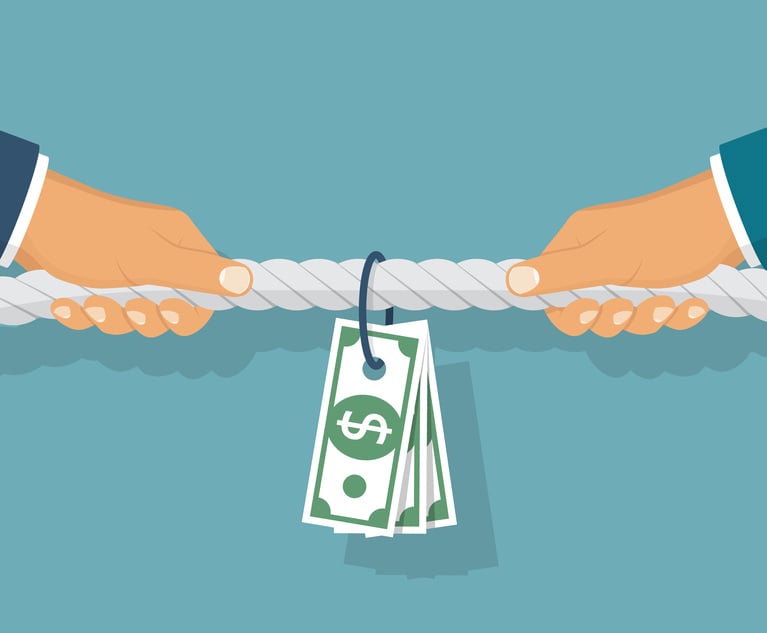Distinguished Leader: Chris Glover
"I think a lawyer needs to be hungry and have an urge to help people. A person's background does not determine if they would be a successful plaintiffs attorney."
June 19, 2019 at 02:00 PM
4 minute read
 Chris Glover of Beasley Allen, Atlanta. (Courtesy photo)
Chris Glover of Beasley Allen, Atlanta. (Courtesy photo)
Chris Glover opened the Atlanta office of plaintiffs boutique Beasley Allen in 2017 and has grown it from two to nine attorneys.
Attorney General Chris Carr chose the Atlanta team to help represent the state of Georgia in its lawsuit against opioid manufacturers and distributors.
Glover's practice remained active, including a wrongful death claim on behalf of the parents of Lacee Dial, who were awarded $12 million by a jury in their suit against Toyota. She was killed in September 2012 when the rear axle of her 1999 Toyota 4Runner fractured, causing the vehicle to roll over and collide with a utility pole. Chris also continues to represent dozens of individuals in the Takata air bag litigation.
What was the biggest challenge you faced in starting Beasley Allen's Atlanta office?
There were many. Although we've represented clients in Atlanta and all over Georgia for many years, relocating my family and actually finding space was a different story. Uprooting my family was the biggest challenge, or so I thought. What felt like a huge leap has turned out to be the best decision we could have made. We love it here in Atlanta. In the beginning, our office consisted of myself and my partner, Navan Ward. Finding office space without knowing how much we would grow was daunting. Little did we know that in less than two years our office and team would increase from two attorneys to nine since we first announced our move.
Immediately following the decision to open the office came the task of getting the word out. Our firm typically teams up with other firms on cases where we offer experience in an area that may not be a regular practice for others. Even before the decision to move, I had met with hundreds of lawyers over the years. Once the decision to open our Atlanta office was made, I met with approximately 150 lawyers in a four-month span. I believe making those connections is what helped lead to our involvement in the Executive Committee of Georgia Trial Lawyers Association. I am truly thankful for the warm welcome we have been given.
How do you advise clients on weighing the pros and cons of settlement offers (or counteroffers) from the defense?
Every case is different. Typically, my clients have lost more than I could imagine. They have lost a loved one, or they or their loved one are so catastrophically injured that their life will never be the same. I just can't let my desires replace theirs when it's not only my job not to do so but because they have lost so much and ultimately it is their decision.
Additionally, you must look at all the issues in the case. They could range from the merits of the case to the venue to the health of the client. I've had just about every issue arise that could impact whether a client should accept a settlement offer. I think it's also important to look at what's happening in the courtrooms across Georgia. Too many people settle for far less than their case is worth, despite the fact that we are seeing some really impressive plaintiff wins. Our clients need to know what can happen and that includes that they could win. At the end of the day, our job is to advise, though. I tell clients all the time that I have certain jobs throughout the case, and they have certain jobs. One of their jobs is to decide on settlement. I also tell them that they will hear from me if I think they are wrong. Again, it's their decision.
This isn't just a job. It's a profession. There is a difference, and I'd love to talk to you more about what that means. For me, though, I take it a step further. It's a calling created from my faith.
What do you look for in hiring plaintiffs' lawyers?
I think a lawyer needs to be hungry and have an urge to help people. A person's background does not determine if they would be a successful plaintiffs attorney. Their background may give clues, but at the end of the day you have to see a desire in the person to help those in need. Plaintiffs attorneys need to be smart, articulate, hard-working and willing to put in the time it takes to develop important business relationships. We expect that from our lawyers, and we try to identify that in them before we hire them.
This content has been archived. It is available through our partners, LexisNexis® and Bloomberg Law.
To view this content, please continue to their sites.
Not a Lexis Subscriber?
Subscribe Now
Not a Bloomberg Law Subscriber?
Subscribe Now
NOT FOR REPRINT
© 2025 ALM Global, LLC, All Rights Reserved. Request academic re-use from www.copyright.com. All other uses, submit a request to [email protected]. For more information visit Asset & Logo Licensing.
You Might Like
View All
On The Move: Energy Infrastructure Pro Joins Moore & Van Allen, Adams & Reese Changes Atlanta Leadership
6 minute read


Trending Stories
- 1'It's Not Going to Be Pretty': PayPal, Capital One Face Novel Class Actions Over 'Poaching' Commissions Owed Influencers
- 211th Circuit Rejects Trump's Emergency Request as DOJ Prepares to Release Special Counsel's Final Report
- 3Supreme Court Takes Up Challenge to ACA Task Force
- 4'Tragedy of Unspeakable Proportions:' Could Edison, DWP, Face Lawsuits Over LA Wildfires?
- 5Meta Pulls Plug on DEI Programs
Who Got The Work
Michael G. Bongiorno, Andrew Scott Dulberg and Elizabeth E. Driscoll from Wilmer Cutler Pickering Hale and Dorr have stepped in to represent Symbotic Inc., an A.I.-enabled technology platform that focuses on increasing supply chain efficiency, and other defendants in a pending shareholder derivative lawsuit. The case, filed Oct. 2 in Massachusetts District Court by the Brown Law Firm on behalf of Stephen Austen, accuses certain officers and directors of misleading investors in regard to Symbotic's potential for margin growth by failing to disclose that the company was not equipped to timely deploy its systems or manage expenses through project delays. The case, assigned to U.S. District Judge Nathaniel M. Gorton, is 1:24-cv-12522, Austen v. Cohen et al.
Who Got The Work
Edmund Polubinski and Marie Killmond of Davis Polk & Wardwell have entered appearances for data platform software development company MongoDB and other defendants in a pending shareholder derivative lawsuit. The action, filed Oct. 7 in New York Southern District Court by the Brown Law Firm, accuses the company's directors and/or officers of falsely expressing confidence in the company’s restructuring of its sales incentive plan and downplaying the severity of decreases in its upfront commitments. The case is 1:24-cv-07594, Roy v. Ittycheria et al.
Who Got The Work
Amy O. Bruchs and Kurt F. Ellison of Michael Best & Friedrich have entered appearances for Epic Systems Corp. in a pending employment discrimination lawsuit. The suit was filed Sept. 7 in Wisconsin Western District Court by Levine Eisberner LLC and Siri & Glimstad on behalf of a project manager who claims that he was wrongfully terminated after applying for a religious exemption to the defendant's COVID-19 vaccine mandate. The case, assigned to U.S. Magistrate Judge Anita Marie Boor, is 3:24-cv-00630, Secker, Nathan v. Epic Systems Corporation.
Who Got The Work
David X. Sullivan, Thomas J. Finn and Gregory A. Hall from McCarter & English have entered appearances for Sunrun Installation Services in a pending civil rights lawsuit. The complaint was filed Sept. 4 in Connecticut District Court by attorney Robert M. Berke on behalf of former employee George Edward Steins, who was arrested and charged with employing an unregistered home improvement salesperson. The complaint alleges that had Sunrun informed the Connecticut Department of Consumer Protection that the plaintiff's employment had ended in 2017 and that he no longer held Sunrun's home improvement contractor license, he would not have been hit with charges, which were dismissed in May 2024. The case, assigned to U.S. District Judge Jeffrey A. Meyer, is 3:24-cv-01423, Steins v. Sunrun, Inc. et al.
Who Got The Work
Greenberg Traurig shareholder Joshua L. Raskin has entered an appearance for boohoo.com UK Ltd. in a pending patent infringement lawsuit. The suit, filed Sept. 3 in Texas Eastern District Court by Rozier Hardt McDonough on behalf of Alto Dynamics, asserts five patents related to an online shopping platform. The case, assigned to U.S. District Judge Rodney Gilstrap, is 2:24-cv-00719, Alto Dynamics, LLC v. boohoo.com UK Limited.
Featured Firms
Law Offices of Gary Martin Hays & Associates, P.C.
(470) 294-1674
Law Offices of Mark E. Salomone
(857) 444-6468
Smith & Hassler
(713) 739-1250






